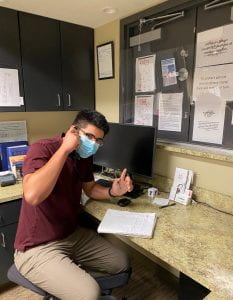Hello everyone! My name is Erik Muro and I am a Junior Hispanic Studies Major. This summer I’m interning at SOS Health Services in College Place. SOS Health Services is a free clinic for underinsured and non-insured people that is run almost entirely by volunteers. I started volunteering at SOS Health Services in the spring semester and once I stepped foot into the clinic, I knew I wanted an internship and an important role for the summer when I noticed first-hand the amount of help underrepresented people needed in the Walla Walla Valley.
A significant project that the clinic director has placed me in charge of is The GoodRx Program. This program is very important to have in the SOS Clinic because it not only serves as a resource for patients, but also is crucial for a clinic that runs on donations and grants from others. To summarize, the GoodRx program gives $150 in a Debit card to patients that are eligible to pay for chronic illness medication. There are also GoodRx discount cards that you can give to patients to reduce the costs of medications. This can be helpful because if you combine the discount cards with the GoodRx Debit cards then the patient can purchase more medication for less!
In order for the patient to be eligible for a debit card, they must meet a few requirements before being evaluated by me and the clinic director. We can gauge their eligibility by handing them a pre-written survey during clinic hours with questions that they will hand back to us so we can look at it in greater detail. The first requirement is that they do not have medical insurance. If they do have medical insurance, then it must not be able to pay for their medications fully.
Secondly, they need to be making less than $1000-1500 a month. The reason behind these numbers is because in that range of salary, the insurance that they are paying for, if they have insurance, is not sufficient enough to pay for their medication. To add on, if they are not currently working, this is a big indicator to me and the clinical director that this patient is a likely candidate for the program. Other measures that help me and the clinical director figure out if the patient is eligible is that they are paying a lot of money for their chronic illness medication. Many of these patients that have diabetes, high blood pressure, heart problems, and/or asthma are paying $100-150 every month or three months for medication. The GoodRx Debit cards alleviate the pressure for patients of having to pay hundreds of dollars for medication.
As mentioned above, the third requirement is notifying us how much per month or three months are the patients paying for medications. These costs can be heavy for patients that need to pay for other things instead of medication. From there, we move onto calling the patient for the program and ask if they are still interested. Once the patient has accepted and consented to being a part of the program, I set up an appointment with the patient to come and pick up the Debit card and to talk with them for about 10 minutes on how to use the debit card. Furthermore, we ask the patient to print and sign their name on a GoodRx Debit Card Receival Form to have on records for the clinic in the future. We then give them the Debit card. After delivering, we just monitor and answer any questions the patient has on the debit card and then we continue looking for new patients.
This internship has been an amazing opportunity for me to work closely with patients and providers and to use my Spanish to communicate and to connect with them. The GoodRx program is a rewarding and fulfilling experience because the patients will call us to let us know how much the Debit cards have helped and that pushes me to continue working hard and learning the intricacies of how a free clinic works.
Experiences like Erik’s are made possible by the Whitman Internship Grant, which provides funding for students to participate in unpaid internships at nonprofit, some for-profit, and government organizations. We are happy to be sharing blog posts from students who were supported by either a summer, fall, spring, or year-long grants at organizations, businesses, and research labs all around the world. To learn how you could secure a Whitman Internship Grant or host a Whitman intern at your organization, contact us at ccec_info@whitman.edu.
